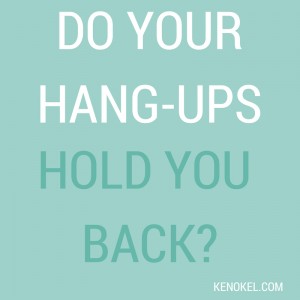 Your hang-ups hold you back by distracting your focus from the important things in your life. Hang-ups will often give inanimate objects a huge amount of power over you. Consider these examples:
Your hang-ups hold you back by distracting your focus from the important things in your life. Hang-ups will often give inanimate objects a huge amount of power over you. Consider these examples:
Bob likes to sit in the same seat for every meeting in the conference room. But one day, that chair is taken and he’s forced to sit elsewhere.
During the whole meeting, Bob is thinking about how he’s not in his preferred location, how he’ll have to come to the next meeting earlier to secure it, and how he’ll get even with the low life who took his seat. At this point, Bob has allowed a chair to take over his mind and knock him off his game.
Sally likes to attend a group exercise class at a local gym. She doesn’t have an issue with the equipment but rather a minor crack that goes through the floor of the exercise room. Before the class begins, she’ll hop from open mat to open mat in order to be as far away from the crack as possible.
“The crack just throws me off,” she says about her frequent moves around the room.
If Sally closed her eyes, she would never know it was there but with her eyes open, it’s all she can see.
These are two examples of hang-ups that are given way too much power over our lives. Odds are in life, you will frequently encounter situations where you don’t get to sit where you want or have a less than desirable view. But how much power do you want to give these occurrences over your life?
Do you hate the movie because you’re not in your favorite spot in the theater?
It’s okay to like what you like but you have to be on the lookout for when this behavior gets obsessive.
A key question to consider is: Does this behavior support me or make me better?
If not, then you need to decide how much power it should have over you. Your time and energy are valuable. Don’t waste them on things that really don’t matter.






